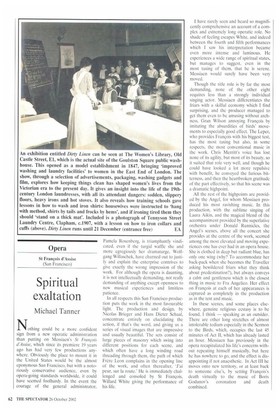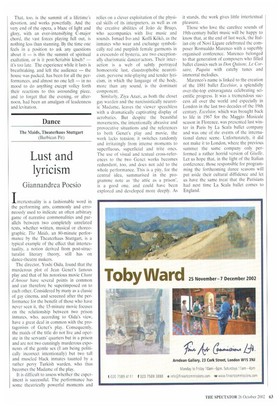Opera
St Francois d'Assise (San Francisco)
Spiritual exaltation
Michael Tanner
Nothing could be a more confident sign from a new operatic administration than putting on Messiaen's St Francois d'Assise, which since its premiere 19 years ago has had very few productions anywhere. Obviously the place to mount it in the United States would be the almost eponymous San Francisco, but with a notoriously conservative audience, even by opera-going standards worldwide, it could have seemed foolhardy. In the event the courage of the general administrator, Pamela Rosenberg, is triumphantly vindicated, even if the turgid waffle she and more egregiously her dramaturge, Wolfgang Willaschek, have churned out to justify and explain the enterprise contrives to give exactly the wrong impression of the work. For although the opera is daunting, it is not intellectually demanding, not really demanding of anything except openness to new musical experiences and limitless patience.
In all respects this San Francisco production puts the work in the most favourable light. The production and design, by Nicolas Bricger and Hans Dieter Schaal, concentrate entirely on elucidating the action, if that's the word, and giving us a series of visual images that are impressive and usually beautiful. The sets consist of large pieces of masonry which swing into different positions for each scene, and which often have a long winding road threading through them, the path of which Frere Leon complains in the opening line of the work, and often thereafter. Tai peur, sur la route.' He is immediately challenged and consoled by St Francois, Willard White giving the performance of his life. I have rarely seen and heard so magnificently comprehensive an account of a complex and extremely long operatic role. No shade of feeling escapes White, and indeed between the fourth and fifth performances which I saw his interpretation became even more intense and luminous. He experiences a wide range of spiritual states, but manages to suggest, even in the most taxing of them, that he is serene. Messiaen would surely have been very moved.
Though the title role is by far the most demanding, none of the other eight requires less than a strongly individual singing actor. Messiaen differentiates the friars with a skilful economy which I find surprising, and the producer managed to get them even to be amusing without archness, Gran Wilson annoying Francois by imitating the absurdities of birds' movements to especially good effect. The Leper, who provides Francois with his biggest test, has the most taxing but also, in some respects, the most conventional music in the work. Chris Merritt's voice has lost none of its agility, but most of its beauty, so it suited that role very well, and though he could have looked a lot more repulsive with benefit, he conveyed the furious bitterness, and then the heartbroken gratitude of the part effectively, so that his scene was a dramatic highpoint.
All the rest of the highpoints are provided by the Angel, for whom Messiaen produced his most ravishing music. In this production, with the sublime singing of Laura Aikin, and the magical blend of the accompaniment provided by the superlative orchestra under Donald Runnicles, the Angel's scenes, above all the concert she provides at the centre of the work, seemed among the most elevated and moving experiences one has ever had in an opera house. She is clothed in deep but radiant blue, has only one wing (why? To accommodate her back-pack when she becomes the Traveller asking bewildered friars what they think about predestination?), but always conveys a calm and gentleness which is the closest thing in music to Fra Angelico. Her effect on Francois at each of her appearances is captured as completely in the production as in the text and music.
In these scenes, and some places elsewhere, genuine religious ecstasy is to be found. I think — speaking as an outsider. There are other long stretches of almost intolerable tedium especially in the Sermon to the Birds, which, occupies the last 45 minutes of Act II, which has already lasted an hour. Messiaen has previously in the opera recapitulated his life's concerns without repeating himself musically, but here he has nowhere to go, and the effect is disappointing if not anaesthetic. In Act III he moves onto new territory, or at least back to someone else's, by setting Francois's death virtually to the music of Boris Godunov's coronation and death combined.
That, too. is the summit of a lifetime's devotion, and works powerfully. And the very end of the opera, a blaze of light and glory, with an ever-intensifying C-major chord, the vast forces playing full out, is nothing less than stunning. By the time one feels in a position to ask any questions about it — is this the summit of spiritual exaltation, or is it post-Scriabin kitsch? — it's too late. The experience while it lasts is breathtaking, and left the audience — the house was packed, has been for all the performances, and almost no one left — in no mood to do anything except volley forth their reactions to this astounding piece, and to forget that the evening, or afternoon, had been an amalgam of leadenness and levitation.



















































































 Previous page
Previous page